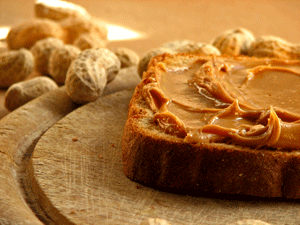The peanut, which is actually related to peas (as well as lentils and beans) rather than nuts, offers a versatile ingredient that compliments both sweet and savory meals. Peanuts come in many varieties, but the types found in the common grocery store are Virginia, Spanish, and Valencia. As long as you are not allergic to this bean disguised as a nut, it can be enjoyed in the form of butter (my favorite), oil, flour, flakes, or just in its whole form. After the last post being about bananas, it only seemed fitting to make peanuts the next topic of choice.
A few of the benefits obtained from peanut consumption are:
- Healthy Heart - diets high in monounsaturated fats, as found in peanuts, have been found to decrease the risk for heart disease. Peanuts are also a great source of vitamin E, niacin, folate, protein, and manganese.
- Antioxidants - peanuts contain a level of antioxidants that compare with fruits like blackberries and strawberries, and actually have more antioxidants than apples, carrots, and beets. They even contain one well-known antioxidant, resveratrol, that is also found in red grapes.
- Healthy Colon - regular peanut consumption has been found to reduce the risk of colon cancer. This is from the nutrients like folic acid, phytosterols, phytic acid, and resveratrol found in peanuts.
- Less Risk of Alzheimer's Disease - niacin-rich foods help reduce the risk of Alzheimer's Disease, and just a handful of peanuts provide close to a quarter of the daily recommended intake.
- Less Risk of Weight Gain - put your fears of peanuts being fatty and causing weight gain to rest. These nutty legumes, as found in one study, decreased the chances of weight gain in men and women by eating nuts just two times a week.
- Find more indepth info at this site.
How might a "health nut" incorporate these into a meal you ask? Well, one obvious, tried and true way is in a sandwich in the form of peanut butter along with jelly, honey, or bananas. See my last post on bananas for some great sandwich ideas!
Try adding a little crunch to your salad by tossing some oven roasted peanuts on top.
 Make your own, "healthier" trail mix by purchasing raw peanuts in bulk and roasting in your oven at 350 degrees until fragrant. Then, add in some dark chocolate chips (better than the candy shelled type that have more sugar), raisins, a low sugar cereal (I like Cheerios, Rice, Wheat, or Corn Chex) and mix all together to take along in the car, at work, or just to have at home.
Make your own, "healthier" trail mix by purchasing raw peanuts in bulk and roasting in your oven at 350 degrees until fragrant. Then, add in some dark chocolate chips (better than the candy shelled type that have more sugar), raisins, a low sugar cereal (I like Cheerios, Rice, Wheat, or Corn Chex) and mix all together to take along in the car, at work, or just to have at home.For something more involved, try making a soup following the recipe found here:
Ingredients:
1 tablespoon peanut oil
1 pound baby carrots
2 ribs celery, chopped
1 large white or yellow onion, sliced
4 1/2 cups water
2 cups fat-free milk
1 pound baking potatoes, peeled and sliced (about 2 large potatoes)
1/3 cup creamy peanut butter
2 tablespoon minced fresh ginger (or 2 teaspoon ground ginger)
1 1/2 teaspoon salt
1 1/2 teaspoon pepper
Preparation:
Place a stockpot over low heat; add the oil, carrots, celery, and onion; cover. Stir occasionally for 8 minutes, or until the onions are translucent. Add the water, milk, potatoes, peanut butter, ginger, salt and pepper. Cover, and bring to a boil. Reduce the heat. Simmer, uncovered, until the veggies are tender, about 25 minutes.
In a blender, puree the soup in batches. Return the pureed soup to the clean stockpot. Adjust the seasonings. Heat though over low heat.
Nutritional Information:
Nutrition per serving: 232 calories; 9 g protein; 30 g carbohydrate; 10 g fat (2 g saturated; 5 g monounsaturated); 1 mg cholesterol; 5 g fiber; 732 mg sodium.
Makes: 6 servings
Check out more fun and flavorful recipes for breakfast, lunch, dinner, and dessert at http://www.nationalpeanutboard.org/recipes.php.
As a side note, please make sure your peanut butter (if not homemade) contains only peanuts and salt in the ingredients. Many brands have very unhealthy hydrogenated oils (trans fats) and added sugar that really take away from the benefits provided from peanuts.
I don't know many people who despise peanuts, but to those that do, try almonds, cashews, or pistachios as they offer some of the same benefits.





No comments:
Post a Comment